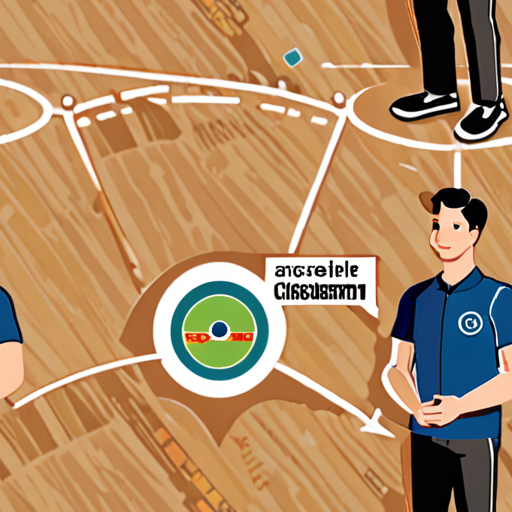As a sports coach, unlocking the secrets to effective coaching strategies can be a game-changer for enhancing student-athlete skills and improving team performance. With the right approach, coaches can foster a positive learning environment, encourage active participation, and help athletes develop essential skills that extend beyond their playing careers. By mastering the 5 principles of coaching, which include fostering a positive learning environment, encouraging active participation and engagement, setting clear goals and expectations, creating a structured and engaging plan, and building confidence and self-esteem, coaches can unlock the full potential of their teams. In this article, we’ll delve into the world of sports coaching, exploring the 4 key principles of sports coaching, the three C’s of coaching, and the 5 principles of coaching, providing actionable tips and insights to help coaches elevate their craft.
The Four Key Principles of Sports Coaching
As a coach, understanding the fundamental principles of sports coaching is crucial for achieving success and developing a winning team.
- Principle of Ownership
- Principle of Responsibility
- Principle of Accountability
- Principle of Reward
This principle emphasizes the importance of individual accountability and responsibility in achieving team goals. Coaches who adopt this principle encourage players to take ownership of their actions, decisions, and outcomes, fostering a sense of autonomy and self-motivation.
By promoting ownership, coaches can create a culture of accountability, where players feel invested in their performance and are motivated to strive for excellence.
The principle of responsibility highlights the need for coaches to take ownership of their own actions and decisions. This includes being accountable for player development, game strategy, and overall team performance.
Coaches who embody this principle demonstrate a commitment to continuous learning, self-improvement, and adaptability, which enables them to make informed decisions and drive positive change within the team.
This principle emphasizes the importance of holding oneself and others accountable for actions and outcomes. Coaches who adopt this principle establish clear expectations, set high standards, and enforce consequences for poor performance.
By promoting accountability, coaches can create a culture of trust, respect, and open communication, where players feel comfortable sharing concerns and ideas, and are motivated to work together towards common goals.
The principle of reward recognizes the power of positive reinforcement in motivating players and driving behavior change. Coaches who adopt this principle use rewards and recognition to acknowledge and celebrate achievements, reinforcing desired behaviors and encouraging continued effort and improvement.
By incorporating rewards into their coaching approach, coaches can create a positive and supportive environment, where players feel valued, motivated, and empowered to succeed.
The Three Cs of Coaching
As someone who strives to achieve peak performance and personal growth, I’ve learned that understanding the principles and practices of coaching can greatly benefit my journey. One essential aspect of coaching is mastering the three Cs: Curiosity, Courage, and Compassion. These traits are commonly found among highly effective coaches, and I’m excited to share how they can help me thrive in various aspects of life.
C – Curiosity
Curiosity is the foundation upon which effective coaching is built. As a curious individual, I’m constantly seeking knowledge and asking questions to gain a deeper understanding of myself and others. By embracing curiosity, I can:
- Develop a growth mindset, recognizing that there’s always room for improvement.
- Pursue opportunities for learning and self-discovery.
- Foster meaningful relationships built on trust and open communication.
C – Courage
Courage is the driving force behind taking calculated risks and stepping outside my comfort zone. By cultivating courage, I can:
- Overcome fears and anxieties that hold me back from achieving my goals.
- Take bold action towards pursuing my passions and interests.
- Develop resilience and perseverance in the face of challenges and setbacks.
C – Compassion
Compassion is the heart of effective coaching, allowing me to connect with others on a deeper level and provide empathetic support. By practicing compassion, I can:
- Create a safe and non-judgmental space for others to express themselves.
- Offer constructive feedback and guidance that promotes growth and development.
- Nurture positive relationships built on mutual respect and understanding.
By embracing the three Cs of coaching – Curiosity, Courage, and Compassion – I can become a more effective coach and leader, empowering myself and others to achieve our full potential.
The Five Principles of Coaching
As a coach, I believe that there are certain fundamental principles that guide my approach to supporting athletes and sports enthusiasts in achieving their goals.
- Principle 1: Establish Clear Goals and Expectations
- Principle 2: Foster a Growth Mindset
- Principle 3: Develop Effective Communication Skills
- Principle 4: Emphasize Self-Awareness and Reflection
- Principle 5: Cultivate a Supportive Community
Before we begin working together, it’s essential to establish clear goals and expectations. This involves understanding what success looks like for each individual athlete, as well as setting realistic targets and timelines for achievement.
I work closely with each athlete to identify their strengths, weaknesses, and areas for improvement, and then develop a personalized plan to help them achieve their objectives.
This principle is critical because it sets the foundation for our coaching relationship and ensures that everyone is on the same page.
A growth mindset is essential for athletes who want to achieve their full potential. It involves embracing challenges, persisting through obstacles, and viewing failures as opportunities for growth and development.
As a coach, I strive to create a supportive environment that encourages athletes to take risks, experiment with new techniques, and learn from their mistakes.
This principle helps athletes develop resilience, confidence, and a love of learning that serves them well both on and off the field.
Effective communication is critical for coaches and athletes alike. It involves active listening, clear expression of needs and wants, and open-mindedness to feedback and suggestions.
I work hard to establish strong relationships with each athlete, built on trust, respect, and empathy. By doing so, we can communicate effectively and efficiently, which enables us to make progress towards our goals.
This principle is vital because it allows us to navigate complex situations, resolve conflicts, and celebrate successes together.
Self-awareness and reflection are essential skills for athletes who want to optimize their performance and achieve their goals. They involve developing a deep understanding of one’s thoughts, feelings, and behaviors, as well as regularly reflecting on experiences and outcomes.
As a coach, I encourage athletes to engage in regular self-reflection, exploring what works well and what doesn’t, and making adjustments accordingly.
This principle helps athletes develop a greater sense of control over their lives, make informed decisions, and cultivate a positive, growth-oriented mindset.
A supportive community is crucial for athletes who want to succeed in their sport. It involves surrounding oneself with people who offer encouragement, motivation, and constructive feedback.
I work to create a network of peers, mentors, and role models who can provide guidance, support, and inspiration to athletes as they pursue their goals.
This principle helps athletes stay motivated, focused, and committed to their objectives, even in the face of adversity or setbacks.
The 5 Basic Elements of a Coaching Session
At Keep Your Eye on the Ball, we believe that every athlete deserves personalized attention and guidance to reach their full potential.
- Establishing Clear Goals
- Building Trust and Rapport
- Focusing on Mindset and Mental Preparation
- Developing Effective Strategies and Tactics
- Providing Ongoing Support and Accountability
A successful coaching session begins with setting clear and achievable goals. As a coach, I work closely with my clients to identify their strengths, weaknesses, opportunities, and threats (SWOT analysis). Together, we set specific, measurable, attainable, relevant, and time-bound (SMART) objectives that align with their overall vision.
Trust is the foundation of any effective coaching relationship. I strive to create a safe, non-judgmental space where my clients feel comfortable sharing their thoughts, feelings, and concerns. By actively listening and empathizing with their experiences, I establish a strong rapport that fosters open communication and mutual respect.
Mental toughness is just as important as physical conditioning. I help my clients develop a growth mindset, cultivate resilience, and manage stress through various techniques such as visualization, positive self-talk, and mindfulness meditation. By equipping them with the tools to navigate challenging situations, I empower them to perform at their best under pressure.
Coaching is not just about providing motivation; it’s also about offering actionable advice and guidance. I work with my clients to develop customized training plans, analyze game footage, and identify areas for improvement. By breaking down complex skills into manageable components, I help them build confidence and competence in their abilities.
The coaching process doesn’t end after a single session. I remain committed to supporting my clients throughout their journey, offering regular check-ins, progress updates, and adjustments to their plans as needed. By holding them accountable for their actions and celebrating their successes, I inspire them to continue striving for excellence.
The 5 Cs of Coaching
At Keep Your Eye on the Ball, we believe that effective coaching requires a combination of key attributes and skills.
- Commitment: A coach who is committed to their team and players is essential for building trust and achieving success.
- Communication: Clear and effective communication is vital for conveying expectations, providing feedback, and motivating players.
- Concentration: Coaches need to stay focused and composed under pressure, making informed decisions quickly and efficiently.
- Control: Maintaining control of the game situation, managing emotions, and staying calm in high-pressure situations are critical skills for coaches.
- Confidence: Building confidence in players through positive reinforcement, constructive feedback, and celebrating successes helps to foster a winning mindset.
By incorporating these 5 Cs into our coaching philosophy, we aim to create a supportive environment that nurtures the development of young athletes and helps them achieve their full potential.
We recognize that there are many excellent resources available to coaches, including Loughborough University ‘s research and innovation initiatives, which offer valuable insights and expertise in the field of coaching and sports science.
As a community-driven platform, we encourage coaches to share their experiences, knowledge, and best practices with one another, fostering a culture of collaboration and continuous learning.
For more information on how to develop your coaching skills and create a winning team culture, visit our coaching resources page.
Remember, effective coaching is about more than just winning games – it’s about developing young people and helping them grow into confident, capable, and compassionate individuals.
The 3 Ps of Coaching
As a coach, understanding the fundamental principles of effective coaching is crucial for achieving success in this field.
- Philosophy
- Purpose
- Process
Philosophy refers to the underlying values, beliefs, and assumptions that guide a coach’s approach to working with clients. A well-defined philosophy helps coaches stay focused on their goals and ensures consistency in their interactions with clients.
A strong coaching philosophy serves as the foundation upon which a coach builds their relationships with clients, informs their decision-making, and influences their communication style.
At Keep Your Eye on the Ball , we emphasize the importance of having a clear coaching philosophy that aligns with our mission to empower athletes and sports enthusiasts to achieve peak performance and personal growth.
Purpose refers to the reason why a coach engages with clients and what they hope to achieve through their coaching relationship. A clear purpose helps coaches stay motivated, focused, and committed to delivering high-quality services.
A well-defined purpose also enables coaches to communicate effectively with clients, set realistic expectations, and measure progress towards their goals.
We believe that every athlete deserves a coach who is passionate about helping them achieve their full potential, and that’s why we’re dedicated to providing exceptional coaching services at Keep Your Eye on the Ball .
Process refers to the methods and techniques a coach uses to work with clients, including their approach to goal-setting, feedback, and accountability. A well-designed process helps coaches deliver consistent results, build trust with clients, and foster a positive coaching environment.
A strong coaching process also enables coaches to adapt to changing circumstances, navigate complex issues, and leverage opportunities for growth and development.
At Keep Your Eye on the Ball , we’re committed to continuously refining our coaching process to ensure that our athletes receive the highest level of support and guidance possible.
Conclusion
In conclusion, the 3 Ps of coaching – philosophy, purpose, and process – are essential components of effective coaching. By understanding and applying these principles, coaches can establish a strong foundation for their practice, build meaningful relationships with clients, and deliver exceptional results.





0 Comments